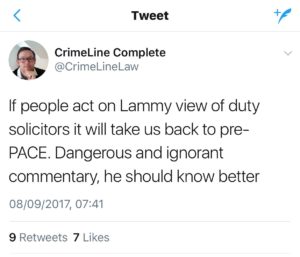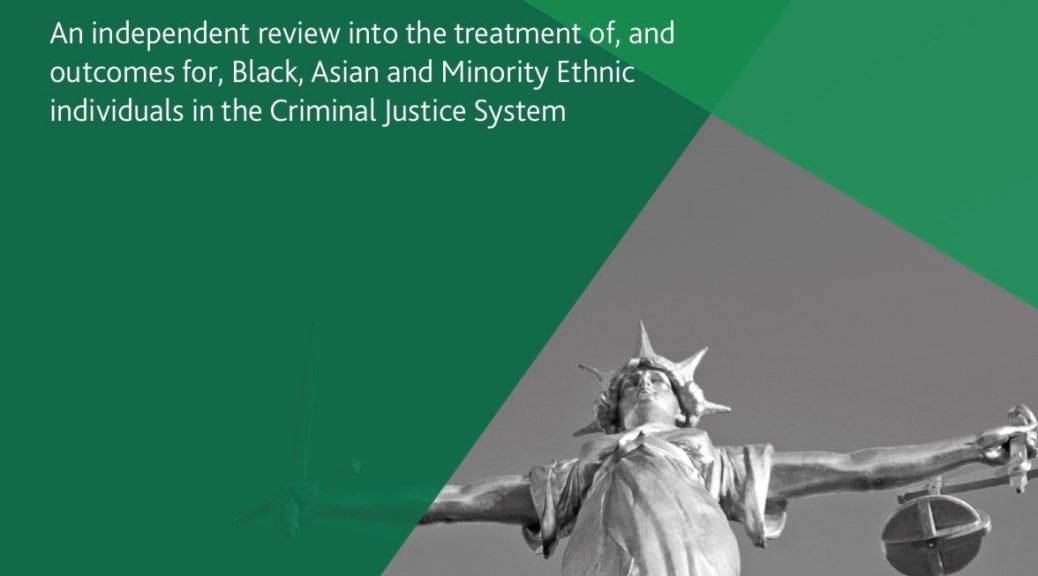Today has seem the publication of the Lammy Review. This is the result of an independent enquiry overseen by David Lammy MP into the treatment of, and outcomes for, Black, Asian and Minority Ethnic (BAME) individuals in the Criminal Justice System.
The need for a review arose because of concerns such as despite making up just 14% of the population, BAME men and women make up 25% of prisoners. Over 40% of young people in custody are from BAME backgrounds.
It is clear that there are very real problems in the justice system as it impacts on those BAME individuals caught up in the system.
Many sensible suggestions in the Lammy Review
Many of the suggestions within the Lammy Review, while clearly sensible, will require more money and resources in the short to medium term, but could deliver both financial savings and savings in terms of wasted lives later on.
To bring in the proposals, aside from the money, there will need to be a change in mind set from politicians. This will have to be coupled with an intention to ‘do the right thing’ and not allow justice policy to be dictated by the tabloid press.
Proposals such as increased diversity in the make-up of Magistrates, deferred prosecutions allowing earlier structured intervention from agencies or the idea of a person’s criminal record being ‘sealed’ following a demonstration that a criminal history is in the past all seem reasonable changes to make.
Missed opportunity to challenge pre-conceptions?
The Lammy Review identifies that many of the problems that arise are due to the perceptions that BAME individuals may hold about the fairness of the system. The report identifies a lack of trust in legal aid-funded solicitors among both White and BAME offenders as a particular problem.
When spoken to. many questioned the motives of the legal aid solicitors, who were often viewed as representing ‘the system’ rather than their clients’ interests. Offenders commonly believed that solicitors did not have the time or the capacity to advise them effectively in any case.
For example, one prisoner comments “I mean, obviously they don’t really care: they’re duty, they’re working for the police as well.”
 A second prisoner confirmed, “I’ve spoken to a lot of people where they have had situations where it almost feels like the duty legal team has taken the opportunity to go to trial, when the individual would have been much better off pleading guilty, the odds were stacked against them, but from a solicitor’s point of view there’s obviously financial benefit for them to continue to trial.”
A second prisoner confirmed, “I’ve spoken to a lot of people where they have had situations where it almost feels like the duty legal team has taken the opportunity to go to trial, when the individual would have been much better off pleading guilty, the odds were stacked against them, but from a solicitor’s point of view there’s obviously financial benefit for them to continue to trial.”
 It is unclear whether any attempts were made to correct the perceptions held by these commentators. It is certainly dangerous to let the views go unchallenged. The ultimate, and perhaps unintended, effect may well be to deter people of whatever background in seeking legal advice during the investigation of an offence.
It is unclear whether any attempts were made to correct the perceptions held by these commentators. It is certainly dangerous to let the views go unchallenged. The ultimate, and perhaps unintended, effect may well be to deter people of whatever background in seeking legal advice during the investigation of an offence.
The Lammy Review would certainly have had an opportunity to comment on whether the views were reasonably held, but seems to have declined to comment one way or another. In relation to particular cases, authority could have been sought to seek the solicitor’s file to see what advice had been given and why. This could have ensured a proper evidential base to support or refute the perceptions.
Lack of action from the Law Society?
Concerns have been expressed that The Law Society fails to promote the services of criminal solicitors in the same way that they endlessly promote family law, wills and conveyancing. The ability to instruct a solicitor to advise a person in the police station is an important right. The Law Society must have an important role in public legal education.
It appears that the burden of such education might fall to individual criminal solicitors. Coincidentally I published an article here earlier this week. Some of the content could be adapted and used locally by practitioners to try and alter damaging perceptions.
 An opportunity to stress the independence of criminal solicitors
An opportunity to stress the independence of criminal solicitors
Criminal legal aid solicitors should use this opportunity to stress that although we are paid by the Government, the free advice and representation that we give is entirely independent of the Government.
Although it is the police who will call us if a suspect is detained in a police station, the free advice and representation that we give is entirely independent of the police. Although it is the Legal Aid Agency that regulates which firms can hold a legal aid contract, the approval of who can act as a duty solicitor is entirely independent of that Agency.
The advantages of instructing a solicitor to advice you in the police station can be found here.
Our professional duty is to our clients, not the Ministry of Justice. This involves a duty to give advice that they need to make the right decisions in their case. It includes a duty of confidentiality. Unless instructed to do so by a client, our advice and their instructions will remain confidential even after the case has ended.
Can legal aid solicitors do more?
As part of a process to change perceptions, legal aid solicitors should share accounts of the work that they undertake and the difference that they can make to their clients’ situation. We publish such accounts on our website. With one or two exceptions, none of the cases are unusual. They hopefully demonstrate the value to  clients of instructing an expert in criminal law throughout the lifetime of a criminal case.
clients of instructing an expert in criminal law throughout the lifetime of a criminal case.
This content can be found here.
The Lammy Review should be taken as an opportunity for criminal legal aid solicitors and their representative bodies to show the work that we do and stress the positive outcomes that we achieve. This, and the positive experiences of our clients, will be the way to correct the false perceptions reported.

